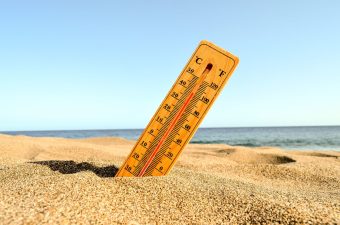
Fabian Quintero)
Continuous research shows that Europe is warming faster than any other continent. The European Environmental Agency (EEA) data indicate that policies and campaigns to adapt to changed climate conditions are not keeping up with the speed of climate change. Moreover, gradual adaptation will not be enough, as urgent actions are needed to eliminate even those risks that are still not assessed as critical.
Namely, the EEA indicates the main climate risks for Europe classified into five groups – ecosystems, food, health, infrastructure and economy&finance.
It has been estimated that almost all risks located in the ecosystem group require urgent or additional measures to the existing ones. Forests, wetlands and other ecosystems are endangered, but marine and coastal ecosystems stand out among them as particularly endangered. Coastal ecosystems are affected by erosion, flooding and sea level rise. The existing pollution in the water ecosystem additionally causes negative consequences due to the increase in water temperature. If we protect, preserve and improve ecosystems and the risks affecting them, the risks related to food, health, infrastructure and economy and finance would also be reduced.
In terms of the food group, southern Europe is particularly affected by heat and drought risks related to crop growth. Although this area is characterized as critical, countries in Central Europe are not out of danger either. Prolonged droughts are a major threat to the security of food and water supply, as the production of food of animal origin requires significant amounts of water. Therefore, one of the solutions is to partially transition from proteins of animal origin to plant-based.
More:
- MELTING OF THE CRYOSPHERE CRYOSPHERE – CHANGES AND CONSEQUENCES
- STATE OF EMERGENCY, RESTRICTIONS AND EMPTY TANKS DUE TO DROUGHT
- THE 2023 TREND CONTINUES – JANUARY 2024 WARMEST YET
High temperatures are the most serious driver of climate risks to human health, according to the EEA. A particularly risky group is people who work outdoors, the elderly and people living in urban areas where heat islands are created or where there is no adequate access to cooling.

In terms of infrastructure, the EEA took into account built areas, as well as energy, water and transport services. Risks from increasingly frequent and extreme floods are still relatively well controlled, however, rising sea levels and stronger storms can cause major damage. Global warming can be mitigated by boosting the energy efficiency of buildings.
All of the aforementioned affects the European economy and finances. For instance, in addition to the material damage that occurs due to floods, storms, droughts and other weather conditions, the threat caused by the mentioned risks has already led to an increase in the insurance premium.
2023 has officially been declared the hottest year on record. The data shows that the average global temperature in the 12 months between February 2023 and January 2024 exceeded pre-industrial levels by 1.5oC.
In order to stop such changes and reduce the risks in the mentioned areas, it is necessary to focus our greatest attention on the first segment, i.e. ecosystems. Their recovery will directly help mitigate other risks. Therefore, according to the EEA, the implementation of the EU Law on Nature Restoration is needed, as well as the restoration of the network of protected areas within and outside of Natura2000. No less important is improving maritime space planning and the implementation of the coastal management plant. Another important factor is reducing, pollution from agricultural and industrial activities.
Energy portal



